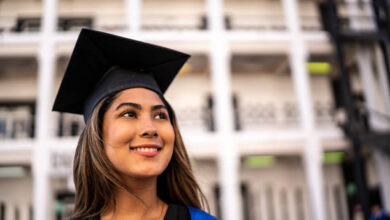Scholarships for Disabled Nigerian Students 2025
Education is a powerful tool that transforms lives and opens doors to countless opportunities. For disabled Nigerian students, scholarships can be a beacon of hope, providing the financial support needed to pursue their academic dreams. As we look ahead to 2025, the landscape of scholarships for disabled students is evolving, offering new opportunities and support mechanisms. This comprehensive guide aims to provide disabled Nigerian students with valuable information on the available scholarships, eligibility criteria, application processes, and success stories to inspire and guide them on their educational journey.
The Importance of Educational Opportunities for Disabled Students
Education is a fundamental right, yet disabled students often face significant barriers that hinder their access to quality education. These barriers include physical challenges, societal attitudes, and financial constraints. Scholarships specifically designed for disabled students are crucial in leveling the playing field, allowing these students to access education, gain skills, and contribute meaningfully to society. By supporting disabled students, we not only empower them but also foster a more inclusive and diverse academic environment.
Relevant Trends and Changes in Scholarship Availability for 2025
As we approach 2025, several trends and changes are shaping the landscape of scholarships for disabled students in Nigeria:
- Increased Awareness and Advocacy: There is growing awareness and advocacy for the rights of disabled individuals, leading to more scholarship opportunities tailored to their needs.
- Government Initiatives: The Nigerian government and various state governments are increasingly recognizing the importance of inclusive education and are offering more scholarships and financial aid programs for disabled students.
- Private Sector Involvement: Private organizations, corporations, and non-profits are stepping up their efforts to support disabled students through scholarships and educational grants.
- International Support: International organizations and foreign governments continue to offer scholarships to disabled Nigerian students, encouraging them to pursue education abroad.
These trends are encouraging, indicating a positive shift towards greater inclusivity and support for disabled students in Nigeria.
Eligibility Criteria
To apply for scholarships, disabled Nigerian students must meet specific eligibility criteria. While the requirements may vary depending on the scholarship provider, the following are common criteria:
General Eligibility Requirements
- Nigerian Citizenship: Applicants must be Nigerian citizens.
- Disability Status: Proof of disability, such as medical certificates or documentation from recognized authorities, is required.
- Academic Performance: A minimum academic performance level, such as a specific grade point average (GPA) or equivalent, is often required.
- Financial Need: Some scholarships prioritize students from low-income families or those facing financial hardships.
Specific Criteria Related to Different Types of Disabilities
- Physical Disabilities: Scholarships for students with physical disabilities may require documentation of mobility impairments, visual or hearing impairments, or other physical conditions.
- Intellectual and Learning Disabilities: Students with intellectual or learning disabilities may need to provide assessments or reports from educational psychologists or special education professionals.
- Chronic Health Conditions: Scholarships for students with chronic health conditions may require medical records or documentation from healthcare providers.
Age, Academic Performance, and Financial Need Requirements
- Age Requirements: Some scholarships have age restrictions, typically targeting students within a specific age range.
- Academic Performance: Maintaining a minimum GPA or academic standing is often required for scholarship eligibility and renewal.
- Financial Need: Scholarships may require proof of financial need, such as income statements, tax returns, or other financial documents.
Types of Scholarships
Government-Sponsored Scholarships
The Nigerian government and various state governments offer scholarships specifically for disabled students. These scholarships aim to promote inclusive education and provide financial support to deserving students.
- Federal Government Scholarships: The Federal Scholarship Board (FSB) offers scholarships to disabled students at the undergraduate and postgraduate levels.
- State Government Scholarships: Various state governments provide scholarships for disabled students, including tuition waivers, stipends, and grants.
Private Scholarships
Private organizations, foundations, and corporations offer scholarships to disabled Nigerian students. These scholarships often focus on specific fields of study or career paths.
- MTN Foundation Scholarship: The MTN Foundation offers scholarships to disabled students pursuing science and technology-related courses.
- Shell Nigeria University Scholarship: Shell Nigeria provides scholarships to disabled students studying engineering and related fields.
International Scholarships
International organizations and foreign governments offer scholarships to disabled Nigerian students, enabling them to study abroad and gain global exposure.
- Chevening Scholarships: The UK government offers Chevening Scholarships to disabled Nigerian students for postgraduate studies in the UK.
- Erasmus+ Scholarships: The Erasmus+ program provides scholarships for disabled Nigerian students to study at participating European universities.
Application Process
Applying for scholarships can be a complex process, but with careful planning and attention to detail, disabled Nigerian students can maximize their chances of success. Here is a step-by-step guide to help navigate the application process:
Step-by-Step Guide on How to Apply for Scholarships
- Research and Identify Scholarships: Begin by researching scholarships available for disabled Nigerian students. Use online databases, scholarship search engines, and official scholarship websites to compile a list of potential opportunities.
- Check Eligibility: Review the eligibility criteria for each scholarship to ensure you meet the requirements. Focus on scholarships that align with your academic goals, disability status, and financial need.
- Prepare Required Documents: Gather all necessary documents, including academic transcripts, proof of disability, financial statements, recommendation letters, and personal statements. Ensure all documents are up-to-date and accurately reflect your qualifications.
- Write a Strong Personal Statement: Craft a compelling personal statement that highlights your achievements, goals, and how the scholarship will impact your education and future. Tailor your statement to each scholarship, addressing the specific criteria and values of the scholarship provider.
- Complete the Application Form: Fill out the scholarship application form carefully, providing accurate and complete information. Pay attention to deadlines and submit your application well before the due date.
- Seek Recommendations: Request recommendation letters from teachers, mentors, or professionals who can speak to your academic abilities, character, and potential. Provide them with sufficient time to write and submit their letters.
- Submit Your Application: Double-check your application for completeness and accuracy before submitting it. Keep copies of all documents and application forms for your records.
Important Dates and Deadlines for 2025
Scholarship application deadlines vary, so it is essential to keep track of important dates. Here are some general timelines:
- Federal and State Government Scholarships: Applications typically open in the first quarter of the year, with deadlines around mid-year.
- Private Scholarships: Application periods vary, but many open in the second half of the year, with deadlines in the last quarter.
- International Scholarships: Deadlines for international scholarships may align with academic calendars of the host countries, often closing in the final quarter of the year.
Tips on Preparing a Strong Application
- Start Early: Begin the application process well in advance to avoid last-minute stress and ensure you have ample time to gather documents and write your personal statement.
- Tailor Your Application: Customize your application to each scholarship, addressing the specific requirements and highlighting your unique qualifications.
- Proofread: Carefully proofread your application and documents to eliminate errors and ensure clarity.
- Seek Feedback: Ask teachers, mentors, or peers to review your application and provide constructive feedback.
Notable Scholarship Programs
Federal Government Scholarships
- Federal Scholarship Board (FSB) Scholarships: The FSB offers scholarships to disabled students at the undergraduate and postgraduate levels, covering tuition fees, accommodation, and stipends.
- Eligibility: Nigerian citizens with documented disabilities, meeting academic and financial need criteria.
- Benefits: Full or partial tuition coverage, accommodation allowances, and stipends for living expenses.
Private Scholarships
- MTN Foundation Scholarship: This scholarship supports disabled students pursuing science and technology-related courses at Nigerian universities.
- Eligibility: Disabled Nigerian students enrolled in accredited science and technology programs.
- Benefits: Tuition fees, book allowances, and stipends for living expenses.
- Shell Nigeria University Scholarship: Shell Nigeria offers scholarships to disabled students studying engineering and related fields.
- Eligibility: Disabled Nigerian students pursuing engineering degrees at accredited universities.
- Benefits: Tuition fees, accommodation, and stipends.
International Scholarships
- Chevening Scholarships: The UK government offers Chevening Scholarships to disabled Nigerian students for postgraduate studies in the UK.
- Eligibility: Disabled Nigerian students with a strong academic background and leadership potential.
- Benefits: Full tuition coverage, living allowances, travel expenses, and access to a global network of professionals.
- Erasmus+ Scholarships: The Erasmus+ program provides scholarships for disabled Nigerian students to study at participating European universities.
- Eligibility: Disabled Nigerian students enrolled in eligible programs at Erasmus+ partner universities.
- Benefits: Tuition fees, travel allowances, and living stipends.
Success Stories
Inspirational Stories of Disabled Nigerian Students
- Grace’s Journey to Academic Excellence: Grace, a visually impaired student from Lagos, received a scholarship from the Federal Scholarship Board. Despite her challenges, she excelled academically and pursued a degree in law. The scholarship covered her tuition fees and provided a stipend for living expenses, allowing her to focus on her studies. Grace’s determination and hard work paid off, and she graduated with honors. Today, she is a practicing lawyer and an advocate for disability rights, inspiring other disabled students to pursue their dreams.
- John’s Path to Engineering Success: John, a student with a hearing impairment from Abuja, was awarded the MTN Foundation Scholarship. With financial support for his engineering studies, John was able to access the necessary resources and technology to succeed. He completed his degree with distinction and secured a job with a leading engineering firm. John now mentors other disabled students, encouraging them to apply for scholarships and achieve their academic and career goals.
Expert Advice
Quotes and Interviews with Experts
- Dr. Adeola Akinyemi, Education Specialist: “Scholarships for disabled students are crucial in promoting inclusive education. These scholarships not only provide financial support but also empower students to overcome barriers and achieve their full potential. I encourage disabled students to explore all available opportunities and apply with confidence.”
- Mrs. Funke Olajide, Scholarship Administrator: “Our scholarship programs are designed to support disabled students in their academic journeys. We prioritize students with strong academic records, leadership potential, and a clear vision for their future. I advise applicants to present a compelling personal statement that showcases their achievements and aspirations.”
Advice from Scholarship Recipients
- Esther, Chevening Scholar: “Receiving the Chevening Scholarship was a turning point in my life. It opened doors to a world-class education and a global network of professionals. My advice to disabled students is to believe in themselves, seek out scholarship opportunities, and never give up on their dreams.”
- Michael, Erasmus+ Scholar: “The Erasmus+ Scholarship gave me the chance to study in Europe and gain valuable international experience. The application process can be challenging, but persistence and thorough preparation are key. Make sure to highlight your unique experiences and how you plan to contribute to your field.”
Resources and Support
- National Association of Disabled Students (NADS): Provides resources and support for disabled students applying for scholarships.
- Educational Counseling Centers: Offer guidance on scholarship applications, document preparation, and personal statement writing.
- Online Forums and Communities: Join online forums and social media groups where disabled students share experiences and tips on applying for scholarships.
Conclusion
Scholarships for disabled Nigerian students in 2025 present a valuable opportunity to overcome financial barriers and pursue higher education. By understanding the eligibility criteria, exploring various scholarship options, and preparing strong applications, disabled students can unlock their potential and achieve their academic dreams. The inspirational success stories and expert advice shared in this guide serve as a testament to the transformative power of education and the impact of scholarships.
We encourage all disabled Nigerian students to take advantage of these opportunities and apply for scholarships. Share this information with others who might benefit, and together, let’s create a more inclusive and supportive educational environment for all.
References
- Federal Scholarship Board. (2024). Retrieved from www.fsb.gov.ng
- MTN Foundation. (2024). Retrieved from www.mtnfoundation.org
- Shell Nigeria. (2024). Retrieved from www.shell.com.ng
- Chevening Scholarships. (2024). Retrieved from www.chevening.org
- Erasmus+ Program. (2024). Retrieved from www.ec.europa.eu/programmes/erasmus-plus
By providing detailed and trustworthy information, this guide aims to empower disabled Nigerian students to pursue their educational aspirations and create a brighter future for themselves and their communities.







